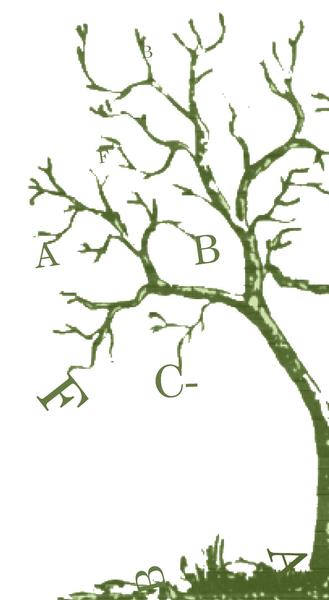
Despite the fact that TCU hasinvested millions in environmentallyfriendly buildings, theuniversity is still receiving belowmediocre marks from the CollegeSustainability Report Card.The overall grade of a C- isbased on an average score fromvarious aspects of a sustainableuniversity, such as administrativepolicies, energy consumption,food and recycling, greenbuilding, student involvementand transportation as well as investmentpriorities and endowmenttransparency.TCU’s only A is in investmentpriorities, thanks to the university’sholdings in renewable energyfunds.The report does recognize AdducoViridis, the student environmentalclub, but despite thepurple bike efforts and the recyclingbins around campus, overallstudent involvement receiveda grade of a D.WHATS IN A GRADE?This year’s overall average is thesame as in 2009, but there havebeen changes in the individualcategories.TCU dropped from a C to a Din the climate change and energycategory, and from a B toa C in transportation, but rosefrom a D to a C in food and recycling.In both 2009 and 2010, theuniversity received an F in theendowment transparency category.Chancellor Victor Boschini saidhe didn’t think the report cardscore was adequately representativeof the school’s efforts tobecome more sustainable.”The survey marks us down fornot making our endowmentholdings public, which the CollegeSustainability Report Cardsays is a way to make the universitymore sustainable,” Boschinisaid. “We aren’t currently doingthat and probably won’t do it inthe future.”In comparison to the overallgrades of other Mountain Westschools, the University of Utahand the University of New Mexicoboth received B’s, the Universityof Wyoming was givena B-, and both Colorado StateUniversity and the University ofNevada-Las Vegas were given aC+. Brigham Young University,the only school in the MountainWest to score lower than TCU,received a D-.Boschini said he’s more interestedin doing what is best forthe campus community thanworrying about the results ofthe report card.”We never do anything to specificallymeet those ratings,”Boschini said. “We’ll look at themost recent one and then we’ll,of course, be aware of whatit says. Then we’ll respond towhatever we think is important.But I’m bigger on doing what’sright for our students.”SUSTAINABLE BUILDINGAnd the university has in recentyears become increasingly morecommitted to lessening the environmentalimpact. ScharbauerHall opened in January as thefirst newly constructed buildingon campus to be certifiedin Leadership in Energyand EnvironmentalDesign. Only one otherbuilding on campus hasearned such recognition.Sherley Hall was awardedan LEED Gold certificationafter itsrenovation in2009.Boschini said theadministrationhas made a commitmentthat allnew buildings willbe built to LEEDspecifications.Zaida Basora, chiefbuilding official for thecity of Dallas and vicechair for the U.S.Green BuildingCouncil NorthTexas chapter, saideligibility for LEED certificationis based on considerationsof five issues: sustainability ofthe site, water efficiency, energyand atmosphere, materials andresources, and indoor environmentalquality.To qualify for certification,a building must receive at least40 points on a 100-point scale.Silver certification is awarded tobuildings with 50 points andgold certification requires 60points. The highest LEED certification,platinum is reservedfor the most sustainable buildings,ones who are awardedmore than 60 points.The approval process beginswhen an institution or businesssubmits the building specifi-
cations online, Basora said. Acommittee studies the informationand will request additionalinformation if necessary.Provost Nowell Donovan, vicechancellor for academic affairs,said constructing LEED certifiedbuildings is slightly moreexpensive in the upfront costs,but in the long run, the universityultimately saves money onenergy costs.THINK PURPLEKeith Whitworth, instructorof sociology and founder ofthe Purple Bike Program createdlast year’s theme “ThinkPurple, Live Green.” In order tojumpstart a movement toward agreener TCU, an online environmentalpledge was presentedto faculty, staff and students aspart of the theme. To sign thepledge, an individual had topick 12 items from a list of tasksthey could do to help the environment.Mike Slattery, department ofenvironmental science chair anddirector of the Institute for EnvironmentalStudies, said AdducoViridis began meeting in2007 after a group of studentsrequested to start an environmentalclub on campus. Thestudents wanted to bring togethergreen and environmentalinitiatives to create a club thatwould be the rallying point forenvironmental issues on campus,he said.The club’s biggest ongoing initiativeis the Green MacawProject in Costa Rica,Slattery said. Because thebirds are an endangeredspecies, students raise moneyto help preserve the Almendrotrees that the green macawsuse as nesting sites. Eachtree costs $500 to preserve, hesaid.In the past two years,students have purchasedtwo fullgrowntrees,planted 18saplings andraised $3,000for a bird rehabilitationcenter.LIVE GREENLee Tatlock, juniormarketing and entrepreneurialmanagement double majoris the resident assistant in theon-campus Living LearningCommunity that is dedicated togreen living, the Green House .Tatlock said he often hostsgreen-theme events for the residentsincluding a screening of
TCU REPORT CARDC- The overall sustainability grade.A For the university’s investment priorities.D Overall student involvement..D In climate change and energy category.C In university transportation.C For university food and recycling.F In the endowment transparency category.
the Disney movie “Earth,” anda presentation from Tony Burgess,professor of professionalpractice in environmental science,on living roofs.Tatlock said it would be beneficialto have recycle bins next toevery trashcan on campus buthe said realistically he knowsthat could be a challenge.WHAT’S NEXTOther schools such as the Universityof North Texas andHarvard University have createdoffices, and hired facultywhose sole responsibility is toimplement and maintain sustainabilityprojects. TCU hasyet to do so and according tothe administration, the universityisn’t looking into hiring anyfull-time faculty to address sustainabilityissues on campus anytime soon.Boschini did say that the universityis constantly finding newways to help make TCU a moregreen friendly campus.”Last year, we purchased morebikes, and built ScharbauerHall, which uses rain water toirrigate around it,” Boschinisaid. “We’re also building MaryWright Admission Center,which is going to be off the gridand generate its own power.”To continue to improve awarenesson campus, Whitworthsaid he and Provost Donovanare working to include moresustainability courses in the curriculum.Currently, there are only a handfulof courses, Sustainability:Environmental, Social and EconomicIssues, EnvironmentalStewardship, Chasing Carbon,Environmental Justice, HumanRights and Agriculture and agraduate-level course titled Sustainabilityand Education.Donovan said the timelinefor when more classes will beimplemented is still uncertain,but the classes could eventuallybecome part of the core curriculum